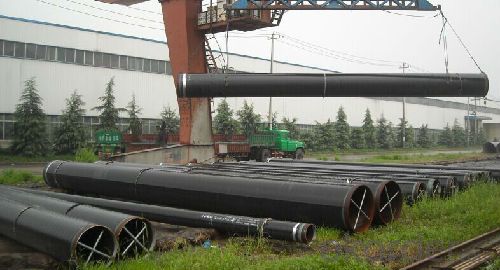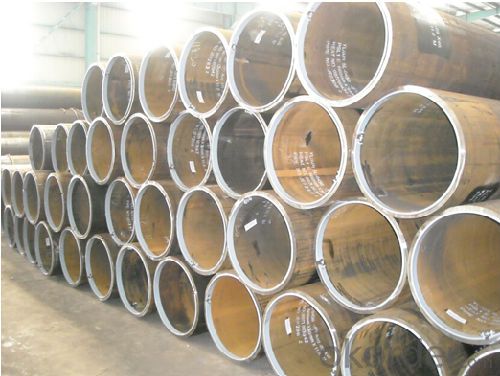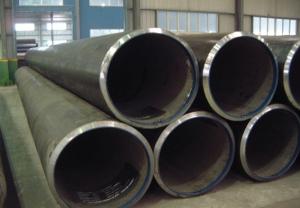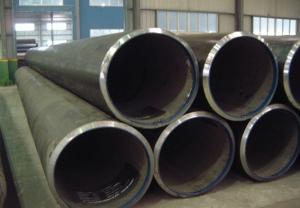Longitudinally welded steel pipe LSAW / ERW
- Loading Port:
- China Main Port
- Payment Terms:
- TT or LC
- Min Order Qty:
- 25MT m.t.
- Supply Capability:
- 9000MT m.t./month
OKorder Service Pledge
OKorder Financial Service
You Might Also Like
Product Description:
1、Structure of API5L CARBON STEEL Longitudinally welded steel pipe LSAW Description:
2、Main Features of the API5L CARBON STEEL Longitudinally welded steel pipe LSAW
• High manufacturing accuracy
• High strength
• Small inertia resistance
• Strong heat dissipation ability
• Good visual effect
• Reasonable price
LSAW PIPE is formed by drawing a solid billet over a piercing rod to create the hollow shell. As the manufacturing process does not include any welding, seamless pipes are perceived to be stronger and more reliable. Historically seamless pipe was regarded as withstanding pressure better than other types, and was often more easily available than welded pipe.
3、 API5L CARBON STEEL Longitudinally welded steel pipe LSAW Images:


- Q:What are the common methods of joining steel pipes?
- The common methods of joining steel pipes include welding, threading, and using mechanical couplings. Welding involves fusing the pipes together using heat, while threading involves screwing the pipes together using threads on the ends. Mechanical couplings are devices that connect the pipes together using compression or other means.
- Q:Is it good to buy a simple wardrobe or a steel pipe?
- Natural nobility, if the quality and the degree of firmness, is the simple steel cloth cabinet is the best. However, because the texture of wood wardrobe, solid wood wood may be used after deformation.
- Q:How do steel pipes handle seismic activities?
- Steel pipes are highly durable and resistant to seismic activities. Their strong and flexible nature allows them to withstand the ground shaking during earthquakes without compromising their structural integrity. Steel pipes are designed to absorb and distribute the energy generated by seismic waves, minimizing the potential damage caused by earthquakes. Additionally, their high strength-to-weight ratio makes them ideal for withstanding the lateral forces and ground movements associated with seismic activities.
- Q:Are steel pipes suitable for potable water applications?
- Yes, steel pipes are suitable for potable water applications. Steel pipes are commonly used for transporting water in various industries and municipal water systems. They are known for their durability, strength, and resistance to corrosion, making them a reliable choice for potable water systems. Steel pipes also have the advantage of being able to withstand high pressure and temperature conditions, making them suitable for both hot and cold water applications. Additionally, steel pipes can be easily welded, ensuring leak-free connections. However, it is important to note that the quality of the steel used and proper maintenance are crucial factors in ensuring the safety and suitability of steel pipes for potable water applications. Regular inspection and maintenance should be done to prevent corrosion and ensure the integrity of the pipes.
- Q:How are steel pipes used in the manufacturing of fire sprinkler systems?
- Steel pipes are commonly used in the manufacturing of fire sprinkler systems due to their durability and fire resistance properties. These pipes serve as a reliable conduit for water or fire suppression agents to flow through, ensuring that the sprinkler system effectively extinguishes fires. The high strength of steel pipes allows for the construction of a robust and long-lasting system that can withstand high pressure and heat, making them an ideal choice for fire safety installations.
- Q:Are steel pipes suitable for transporting fluids?
- Yes, steel pipes are suitable for transporting fluids. They have high tensile strength, durability, and resistance to corrosion, making them an ideal choice for transporting various fluids, including water, oil, gas, and chemicals, over long distances. Steel pipes are commonly used in industries such as oil and gas, water treatment, and manufacturing due to their ability to withstand high pressure and temperature conditions.
- Q:Where is a steel pipe casing usually used?
- Classification of casing: rigid casing, flexible waterproof sleeve, steel pipe sleeve and iron sheet bushing, etc..
- Q:What are the different types of threading on steel pipes?
- There are several types of threading commonly used on steel pipes, including tapered or NPT (National Pipe Taper), straight or NPS (National Pipe Straight), and British Standard Pipe (BSP) threading. These different types of threading are designed to ensure a secure and leak-free connection between pipes and fittings.
- Q:What are the safety regulations for working with steel pipes?
- The safety regulations for working with steel pipes may vary depending on the specific circumstances and location, but some common safety measures include wearing appropriate personal protective equipment (PPE) such as gloves, safety glasses, and steel-toed boots, ensuring proper handling techniques to prevent injuries, using proper lifting equipment to prevent strain or back injuries, implementing proper ventilation and respiratory protection when working in confined or poorly ventilated spaces, and following proper procedures for welding, cutting, or bending steel pipes to minimize the risk of fire or explosions. It is essential to consult and adhere to local safety regulations and guidelines to ensure a safe working environment when dealing with steel pipes.
- Q:How do steel pipes compare to other pipe materials like PVC or copper?
- Steel pipes have several advantages over other pipe materials like PVC or copper. Firstly, steel pipes are incredibly strong and durable, making them suitable for high-pressure applications and long-term use. They have a higher resistance to cracking or breaking, which is especially beneficial in demanding environments. Secondly, steel pipes have excellent heat resistance, making them ideal for transporting hot fluids. On the other hand, PVC pipes are more lightweight, cost-effective, and easy to install, making them suitable for non-pressure applications. Copper pipes are known for their corrosion resistance and ability to handle high temperatures, but they are typically more expensive. Overall, the choice between steel, PVC, or copper pipes depends on the specific requirements of the application, considering factors like pressure, temperature, cost, and ease of installation.
1. Manufacturer Overview |
|
|---|---|
| Location | |
| Year Established | |
| Annual Output Value | |
| Main Markets | |
| Company Certifications | |
2. Manufacturer Certificates |
|
|---|---|
| a) Certification Name | |
| Range | |
| Reference | |
| Validity Period | |
3. Manufacturer Capability |
|
|---|---|
| a)Trade Capacity | |
| Nearest Port | |
| Export Percentage | |
| No.of Employees in Trade Department | |
| Language Spoken: | |
| b)Factory Information | |
| Factory Size: | |
| No. of Production Lines | |
| Contract Manufacturing | |
| Product Price Range | |
Send your message to us
Longitudinally welded steel pipe LSAW / ERW
- Loading Port:
- China Main Port
- Payment Terms:
- TT or LC
- Min Order Qty:
- 25MT m.t.
- Supply Capability:
- 9000MT m.t./month
OKorder Service Pledge
OKorder Financial Service
Similar products
New products
Hot products
Related keywords






























